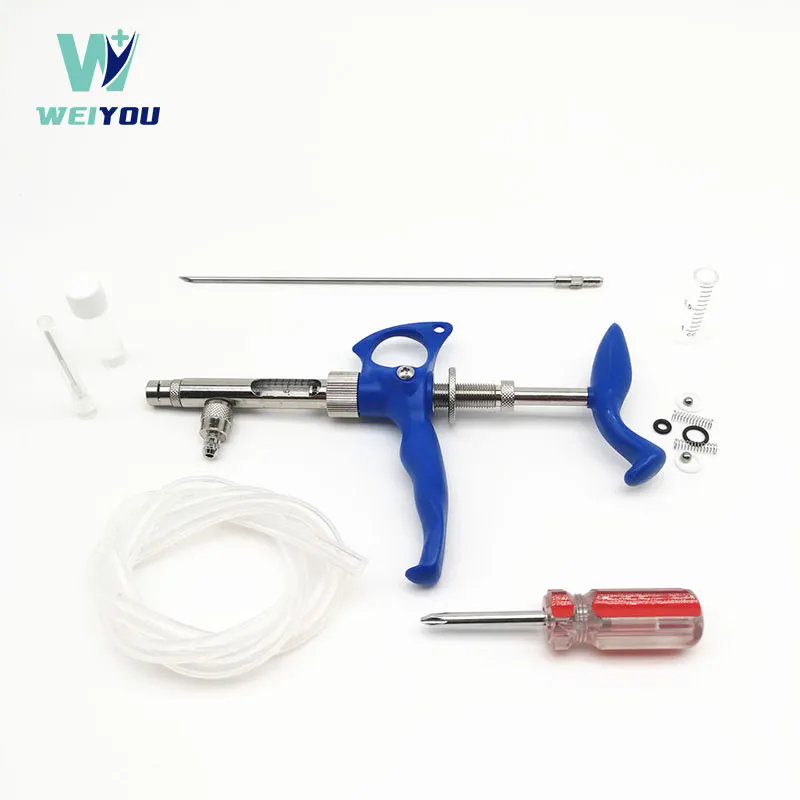The Essential Role of Veterinary Vaccine Syringes: Ensuring Animal Health and Welfare
2024-08-15
In the realm of veterinary medicine, the importance of vaccinations cannot be overstated. Vaccines play a crucial role in preventing diseases, ensuring the health of animals, and safeguarding public health. To administer these vaccines effectively, veterinary professionals rely on specialized tools, with veterinary vaccine syringes being one of the most critical. These syringes are designed to handle the unique requirements of veterinary care, and understanding their features and benefits can enhance their use in practice.
1. What is a Veterinary Vaccine Syringe?
A veterinary vaccine syringe is a specialized medical instrument used to administer vaccines to animals. Unlike standard syringes used for human medicine, veterinary vaccine syringes are designed to accommodate the diverse needs of different animal species, ranging from small pets to large livestock. These syringes are crafted to ensure precise dosing, minimize stress on animals, and provide ease of use for veterinarians.
2. Key Features of Veterinary Vaccine Syringes
Veterinary vaccine syringes come with several features tailored to the needs of animal health care:
- Needle Size and Type: Veterinary syringes are equipped with various needle sizes and types to match the size and species of the animal. For instance, smaller needles are used for small pets like cats and dogs, while larger needles are required for larger animals like horses and cattle.
- Graduated Scales: These syringes often have graduated scales to allow for accurate measurement of the vaccine dose. This is essential for ensuring that animals receive the correct amount of vaccine.
- Safety Mechanisms: Many veterinary syringes include safety features such as needle guards or retractable needles to protect against needle-stick injuries and contamination.
- Ergonomic Design: The syringes are designed with ergonomics in mind to make them comfortable for veterinarians to use, especially during long procedures or when handling multiple animals.
- Durability and Material: Veterinary vaccine syringes are typically made from high-quality, durable materials that can withstand repeated use and ensure sterility. Common materials include medical-grade plastics and stainless steel.
3. Benefits of Using Veterinary Vaccine Syringes
The use of veterinary vaccine syringes offers several advantages in animal health care:
- Accurate Dosing: The precise measurement capabilities of veterinary syringes ensure that animals receive the correct dose of vaccine, which is crucial for effective immunization.
- Reduced Stress: Properly designed syringes help reduce the stress and discomfort experienced by animals during vaccination. Features such as smaller needles and ergonomic designs contribute to a more positive experience for the animal.
- Enhanced Safety: Safety mechanisms built into the syringes help prevent accidental needle sticks and contamination, protecting both veterinary staff and animals.
- Versatility: Veterinary vaccine syringes are versatile and can be used for a wide range of vaccines and injections, making them suitable for various types of animals and conditions.
- Improved Efficiency: The ease of use and accurate dosing capabilities of these syringes enhance the efficiency of vaccination procedures, allowing veterinarians to manage time effectively and provide better care.
4. Applications of Veterinary Vaccine Syringes
Veterinary vaccine syringes are used in various settings, including:
- Veterinary Clinics: In clinics, these syringes are used to administer routine vaccinations for pets such as dogs and cats, as well as more specialized vaccines for exotic animals.
- Farm and Livestock Management: For larger animals such as cattle, pigs, and horses, veterinary vaccine syringes are used to administer vaccines to protect against diseases common in livestock.
- Animal Shelters and Rescue Organizations: These syringes are essential in shelters and rescue organizations where multiple animals need to be vaccinated quickly and efficiently.
- Wildlife Conservation: Veterinary vaccine syringes are also used in wildlife conservation efforts to administer vaccines to wild animals, helping to control the spread of diseases in natural populations.
5. Choosing the Right Veterinary Vaccine Syringe
When selecting a veterinary vaccine syringe, consider the following factors:
- Animal Size and Species: Choose a syringe with an appropriate needle size and capacity for the specific animal being vaccinated.
- Vaccine Type: Ensure the syringe is compatible with the type of vaccine being administered, including its viscosity and volume.
- Ease of Use: Look for syringes that are ergonomically designed and easy to handle, especially if you will be administering multiple vaccines.
- Safety Features: Opt for syringes with built-in safety mechanisms to minimize the risk of needle-stick injuries and ensure a sterile environment.
- Quality and Sterility: Select syringes made from high-quality materials and ensure they are sterile to prevent infections and complications.
Conclusion
Veterinary vaccine syringes are a vital component in the field of animal health, playing a key role in ensuring effective vaccination and maintaining the well-being of animals. By understanding their features, benefits, and applications, veterinarians and animal care professionals can make informed choices that enhance the quality of care they provide. Whether in a clinic, on a farm, or in wildlife conservation, the right veterinary vaccine syringe contributes to better health outcomes and a more efficient vaccination process.



